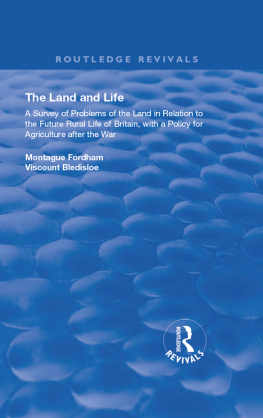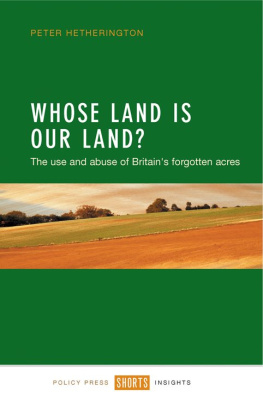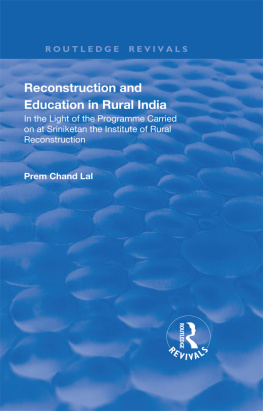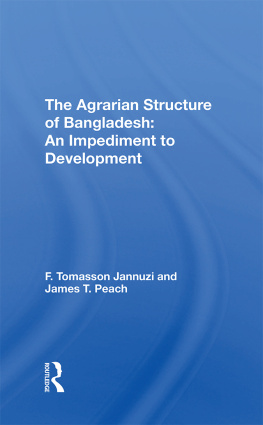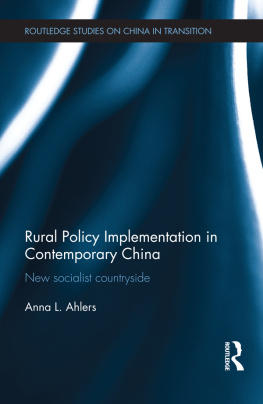Routledge Revivals
The Land and Life
The
Land and Life
A Survey of Problems of the Land in
Relation to the Future Rural Life of
Britain, with a Policy for Agriculture
after the War
Prepared for the Rural Reconstruction
Association by
Montague Fordham
With an Introduction by
Viscount Bledisloe
First published in 1942 by George Routledge & Sons, Ltd.
This edition first published in 2018 by Routledge
2 Park Square, Milton Park, Abingdon, Oxon, OX14 4RN
and by Routledge
52 Vanderbilt Avenue, New York, NY 10017
Routledge is an imprint of the Taylor & Francis Group, an informa business
1942 by Taylor & Francis
All rights reserved. No part of this book may be reprinted or reproduced or utilised in any form or by any electronic, mechanical, or other means, now known or hereafter invented, including photocopying and recording, or in any information storage or retrieval system, without permission in writing from the publishers.
Publishers Note
The publisher has gone to great lengths to ensure the quality of this reprint but points out that some imperfections in the original copies may be apparent.
Disclaimer
The publisher has made every effort to trace copyright holders and welcomes correspondence from those they have been unable to contact.
A Library of Congress record exists under ISBN:
ISBN 13: 978-0-367-18011-9 (hbk)
ISBN 13: 978-0-429-05910-0 (ebk)
The
LAND AND LIFE
A Survey of Problems of the Land in
Relation to the Future Rural Life of
Britain, with a Policy for Agriculture
after the War
Prepared for the Rural Reconstruction Association by
MONTAGUE FORDHAM
F.R.Hist.S., F.R.Econ.S.
With an Introduction by
VISCOUNT BLEDISLOE
P.C., G.G.M.G., K.B.E.
LONDON
GEORGE ROUTLEDGE & SONS, LTD.
BROADWAY HOUSE, 6874 GARTER LANE, E.G.4
First published 1942
THIS BOOK IS PRODUCED
IN COMPLETE CONFORMITY WITH
THE AUTHORIZED ECONOMY STANDARDS
Printed in Great Britain by Butler & Tanner Ltd., Frome and London
CONTENTS
BY VISCOUNT BLEDISLOE
T HIS little book, conceived in outline by Mr. Montague Fordham, a life-long enthusiast for agricultural reforms, and reflecting the aims of the Rural Reconstruction Association, is a thoughtful and timely compendium of views regarding the rehabilitation of Britains countryside and Britains country-folk, expressed, after long-continued study of our intricate rural problem, with obvious sincerity, unshackled by political or class prejudice and with a transparent conviction that the agricultural renaissance of Englands green and pleasant land is an indispensable condition of her future stability, and of her physical, moral and spiritual well-being. Many there be of all classes, creeds and political attachments who pray fervently for a new and better Britainas part of, and an examplar to, a new and better worldafter the present war, an unsettling experience, violent in its impact upon cherished beliefs and century-old traditions. But, as none have suffered in our pre-war Britain, with her false gods and increasingly sordid objectives, more acutely than her rural community (in theory the backbone of every nation) it behoves every class of that community to acclaim with hopeful confidence the prospect of a very different world, imbued with a truer assessment of human values, and, so far as its influence goes, to strive earnestly and selflessly to shape it wisely and well in the supreme interests of our beloved Motherland. It is, I opine, the conviction of the authors of this rural textbook that the prudently planned economic revitalization of our most essential industry and its progressive development can alone provide the foundation of a better Britain, which has eventuated in its publication under the auspices of the Rural Reconstruction Association. Throughout its pages it affords sound food for thought for all who really love their country and are capable of viewing its destinies and their own ultimate welfare, not from the narrow standpoint of transient and ephemeral personal advantage, but from the broader and firmer foothold of national stability founded on a thriving husbandry. As such, without necessarily endorsing all its arguments and proposals, I warmly commend it to the favourable consideration of the numerous devoted patriots of all classes and vocations to whom the present war has revealed (if they did not realize it before) that theres something rotten in the State of Britain, but who did not clearly perceive what it was. The authors wisely contend that if the advocates of rural revival are to succeed in promoting a sound reconstruction policy they must be agreed among themselves as to the main issues involved. It is above all essential that at least in the ranks of the rural community, whatever be their social status or their political faith, there should be, henceforth, cohesive resistance to all forces, seen and unseen, proximate and remote, which undermine the stability, happiness and contentment of those directly dependent upon Britains most vital industrythe only true source of wealth in its widest significance. Among the opponents of change are, it is suggested, those, some within the ranks of agriculturists, who imagine that they possess a monopoly, of which they may be deprived with the expansion of the industry and its more equitable all-round treatment at the hands of the State. To decry such expansion in a country where 35 per cent. of the population are ill-nourished is not merely short-sighted and unpatriotic. It is toying with the almost certain prospect of social revolution. The depletion of our rural population through economic causes is deplored as a great national misfortune. It has not even its compensations in the progressive settlement of British migrants overseas, where several millions of square miles of available territory of conspicuous fertility (the envy of other nations) over which floats the Union Jack, await occupation and settlement by people of our own race. There is practically no peace-time migration from our shores to-day. Unless our rural population increase in numbers and virility we cannot utilize our immense overseas heritage. But, as this book wisely indicates, the ladder of settlement should first be planted with its lowest rungs in the soil of the Mother Country, climbed and easily climbable by humble folk, not all sprung from a rural environment, but inclusive of allotment-holding miners, factory workers and others who at heart, and possibly by family tradition, are Sons of the Soil. The agricultural policy of this country should be built up on the welfare and enthusiasm of the small-scale food producer and not on those of the large-scale farmer. If husbandry is really a worthwhile job and remunerative to the former, the latter can stand on his own feet economically without subsidy or other Government charity, assuming that he is equipped with energy, experience and adequate capital.
The gradual decentralization of urban industry, the widespread availability of electrical energy and the rapidity of modern transport all help to bring townsman and countryman into closer contact and sympathy and facilitating their access to each others vocations. The authors of this book tell us that civilization comes, no doubt, from the towns. But is there any reason why it should ? The derivation of the word civilization, like that of urbanity and politeness certainly support this contention.

